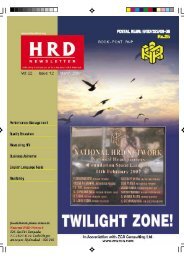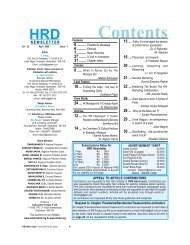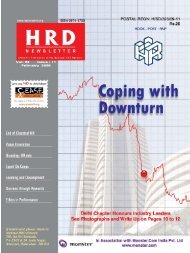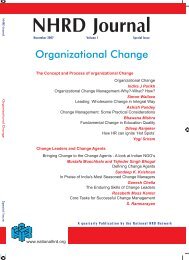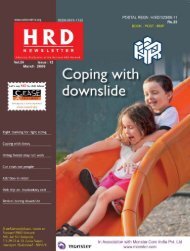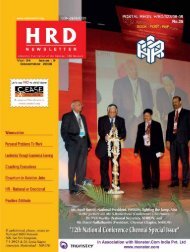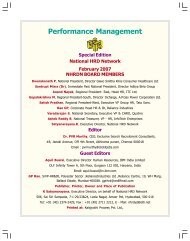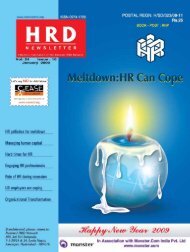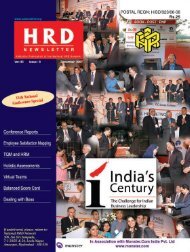5 ........................Chennai Chapter Report 6 ... - National HRD Network
5 ........................Chennai Chapter Report 6 ... - National HRD Network
5 ........................Chennai Chapter Report 6 ... - National HRD Network
You also want an ePaper? Increase the reach of your titles
YUMPU automatically turns print PDFs into web optimized ePapers that Google loves.
Lead Feature<br />
Competencies for<br />
Credible HR<br />
What does any star performer in human<br />
resource (HR) function do? How can<br />
we measure the performance of HR<br />
functionaries? Can HR goals be aligned with<br />
business? Many such questions were often<br />
asked for decades but there has not been<br />
much success in finding answers. The<br />
yesteryears' knowledge and skills may not<br />
necessarily hold good today. HR<br />
functionaries need to sharpen their skills,<br />
redefine their roles and drive the business<br />
to gain the credibility of the stakeholders<br />
they serve.<br />
In this connection a group of researchers<br />
led of Michigan University professor Dave<br />
Ulrich in America has developed a<br />
competency model to benchmark the<br />
performance of HR managers. In this study<br />
the researchers have identified six core<br />
competencies that high-performing HR<br />
professionals personify. Each competency<br />
is broken out into measurable performance<br />
elements. These new competencies<br />
supersede the five competencies outlined<br />
in the 2002 human resource competency<br />
study (HRCS) the last study conducted by<br />
the same researchers, reflecting the<br />
continuing evolution of the HR profession.<br />
What is HR Competency: HR<br />
Competencies are behaviours of HR<br />
Managers at work which result in superior<br />
or average performance. These behaviours<br />
are caused by the knowledge, skills, self<br />
concept, traits and motives of HR<br />
professionals which lead to performance<br />
outcome. HR professionals with the right<br />
competencies will perform better. They will<br />
be more likely, to engage employees, to<br />
serve customers, and to create intangible<br />
shareholder wealth. HR competencies<br />
define what is expected from those who<br />
work in HR and form the basis for<br />
assessment and improvement in the quality<br />
of HR professionals.<br />
To address these issues for the HR<br />
profession, large-scale survey (Human<br />
Resources Competency Study, HRCS) of<br />
HR professionals and their HR and non-HR<br />
associates were initiated in 1988, 1992,<br />
1997, 2002 and in 2007 by Dr Ulrich and<br />
his associates. In all these studies the data<br />
was collected using 360 degree<br />
methodology. Questionnaires were sent to<br />
HR professionals (participants) who then<br />
gave them to their colleagues (associates).<br />
These questionnaires asked about the<br />
competencies and performance of the<br />
concerned HR professional and the<br />
performance of the business where the said<br />
HR professional worked.<br />
The objectives of HR competency studies<br />
were to resolve three issues namely to (1)<br />
define the competencies that add greatest<br />
value to key stakeholders; (2) figure out how<br />
HR professionals develop these<br />
competencies in the fastest and most<br />
effective ways; and to (3) determine how<br />
HR competencies and HR practices align<br />
to business performance.<br />
The 2007 study involved data collection from<br />
10063 (1700 HR professionals and 8363 of<br />
their associates) respondents representing<br />
413 organizations from different countries<br />
across the world. There were 2773 (28%)<br />
respondents from North America; 2127<br />
(21%) from Latin America; 1553 (15%) from<br />
Europe; 2110 (21%) from China; 1235 (12%)<br />
from Australia and Asia Pacific region and<br />
263 (3%) from India. These respondents<br />
represent three groups namely (1)<br />
participating HR professionals completed<br />
the survey in evaluating themselves; (2) HR<br />
professionals who are peers or associates<br />
evaluated the participating HR<br />
Professionals; and (3) Non-HR associates<br />
who are generally line executives and<br />
internal customers evaluated the<br />
participating HR professionals. These<br />
groups provided the opportunity to look at<br />
different perspectives regarding HR as a<br />
profession, the HR department, and the<br />
competencies needed by HR professionals<br />
to be effective in their organization.<br />
The Novelty: The HR competencies of 2007<br />
do have similarities with the 2002 model.<br />
But at the same time there is value add in<br />
the latest one. Five years ago, HR's role in<br />
managing culture was embedded within a<br />
broader competency. Now its importance<br />
merits a competency of its own. Knowledge<br />
of technology, a stand-alone competency in<br />
2002, now appears within Business Ally. In<br />
other instances, the new competencies carry<br />
expectations that promise to change the way<br />
HR views its role. For example, the Credible<br />
Activist calls for HR to eschew neutrality and<br />
Dr. G.Pandu Naik is Head of MBA Programme at PES Institute of Technology. He can be reached at drgpn@yahoo.com<br />
– Dr.G.Pandu Naik<br />
to take a stand- to practice the craft with an<br />
attitude.<br />
Ulrich in this study urges HR to reflect on<br />
the new competencies and what they reveal<br />
about the future of the HR profession. His<br />
message is direct and unforgiving. "Legacy<br />
HR work is going, and HR people who don't<br />
change with it will be gone." Still, he remains<br />
optimistic that many in HR are heeding his<br />
call. "Twenty percent of HR people will never<br />
get it; 20 percent are really top performing.<br />
The middle 60 percent are moving in the<br />
right direction. Within that 60 percent there<br />
are HR professionals who may be at the<br />
table but are not contributing fully. That's<br />
the group I want to talk to. ... I want to show<br />
them what they need to do to have an<br />
impact." says Ulrich.<br />
The super six<br />
The six competencies from 2007 study<br />
described below and the elements that make<br />
them up, offer outlines of what it takes to be<br />
successful in HR profession.<br />
Credible Activist: HR professionals need<br />
to be credibly active in discharge of their<br />
duties. The Credible Activist is respected,<br />
admired and listened. He offers a point of<br />
view, takes a position and challenges<br />
assumptions by; delivering results with<br />
integrity; sharing information; building<br />
relationships of trust; and doing HR with an<br />
attitude (taking appropriate risks, providing<br />
candid observations, influencing others).<br />
The Credible Activist is at the heart of what<br />
it takes to be an effective HR leader. The<br />
best HR people do not hold back; they step<br />
forward and advocate for their position.<br />
CEOs are not waiting for HR to come in with<br />
options-they want your recommendations;<br />
they want you to speak from your position<br />
as an expert.<br />
Cultural Steward: The Cultural Steward<br />
recognizes, articulates and helps shape a<br />
company's culture by: facilitating change;<br />
crafting culture; valuing culture; and<br />
personalizing culture (helping employees<br />
find meaning in their work, managing work/<br />
life balance, encouraging innovation). HR<br />
has always owned culture. This is the first<br />
time it has emerged as an independent<br />
competency. Of the six competencies,<br />
Cultural Steward is the second highest<br />
| <strong>HRD</strong> News Letter | April 2008, Vol.24, Issue:1 15



